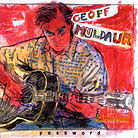November 2000
Apart from a couple of adaptations, Muldaur only takes two composing credits on this album: "Kitchen Door Blues," the opening song, and "Got To Find Blind Lemon – Part Two," the last. "Kitchen Door Blues" is a Tennessee Williams poem Muldaur set to music; the disc’s closer is a sequel to The Secret Handshake’s Blind Lemon Jefferson tribute "Got To Find Blind Lemon – Part One" -- musically it’s nearly identical, but it has new lyrics. I’m guessing "Kitchen Door Blues" was selected to lead off the collection for two key reasons: It opens with one of Muldaur’s straightforward yet very engaging blues-guitar riffs, and it’s so solidly rooted in the blues tradition that it sets the tone for the rest of the CD. David Lindley, a fine guitarist who participated on early-1970s Jackson Browne tracks, and Wally Ingram, on drums, flesh out the song’s sparse accompaniment. "Got To Find Blind Lemon – Part Two" sends us packing with a similar austerity. About as simple as can be, it features Muldaur’s guitar and voice without further accompaniment. Whereas "Part One" had taken us on the singer’s journey to "find Blind Lemon, see that his grave is kept clean" -- in part, a metaphorical mission to preserve the blues -- "Part Two" has the singer and his friends actually finding the blues giant’s grave after obtaining brooms and braving storms. The song reminds us that they are doing Blind Lemon the "one kind favor" he asked for in "See That My Grave Is Kept Clean." John Adam Estes’s "Drop Down Mama" fills the number-two slot -- a blues cut with a richer arrangement and more fire than "Kitchen Door Blues." Clarence Clay & William Scott’s gospel classic "Wait ‘til I Put On My Robe," Charlie Patton’s "Some of These Days (I’ll Be Gone)," Blind Willie Johnson’s "Trouble Soon Be Over," Eric Von Schmidt’s "Light Rain," and Tewee Blackman’s "K.C. Moan" also recall the blues and gospel emphases of Handshake. But several cuts veer off in a different direction from that of the preceding disc. "At the Christmas Ball" -- with Muldaur’s daughter Clare singing lead with distinctive charm and considerable mastery -- is a Frank W. Longshaw number Muldaur originally learned from Bessie Smith recordings. Here it is performed in the style of the Jim Kweskin Jug Band, Muldaur’s group of decades ago. It evokes the playfulness of a child’s anticipation of Christmastime, which "comes only once a year," and of the ball at which "everybody’s full of pep." "Mary of the Wild Moors" is a folk ballad of an entirely different sort musically. Played in a waltz tempo, it completely departs from blues and gospel chord progressions, but it maintains Muldaur’s focus on the most basic, primal human desires. "Poor Mary" returns "on one cold wintry night" to her home on the wild moors, from whence she regrets having strayed. She is carrying her child. Her father is deaf to her cries and the next morning he finds his daughter dead, the baby alive, "still clasped in his dead mother’s arms." The old man "in his grief pined away"; the child soon joins his mother in death; and no one ever goes to the cottage on the moors. Lead fiddle is nicely played by Richard Greene, with Margaret Wooten putting the bow to an additional one. The William J. Hill cowboy tune "Prairie Lullaby" finds a tasteful place for clarinet, bassoon, and French horn in a nighttime prairie landscape. "Saddle up your pony, the Sandman’s here/To guide you down the trail of dreams./Tumble in bed my tired, my little sleepy head, to a prairie lullaby," goes the lilting bridge. Before closing with "Blind Lemon – Part Two," Muldaur sings the Methodist hymn "Beautiful Isle of Somewhere," bringing back the small wind ensemble sound of "Prairie Lullaby." Password is a recording where a well-traveled musician lovingly sings the songs he loves, attending carefully to his phrasing, and taking obviously pleasure from letting lots of other skilled musicians in on his fun. GO BACK TO: |
 Geoff Muldaur - Password
Geoff Muldaur - Password![[Reviewed on CD]](../format/regcd.gif) Think
of Password as the companion disc to Geoff Muldaur’s 1998 CD, The Secret
Handshake -- an excellent blues and gospel compilation including several original
tunes by Muldaur. Password finds him singing and playing guitar with a large
assemblage of musicians, bringing some wonderful blues, R&B, gospel, folk, and
pre-Nashville country-western songs to our attention. Muldaur’s steady,
straightforward singing and clever, although sometimes crowded, arrangements unify the
potentially chaotic mix of genres.
Think
of Password as the companion disc to Geoff Muldaur’s 1998 CD, The Secret
Handshake -- an excellent blues and gospel compilation including several original
tunes by Muldaur. Password finds him singing and playing guitar with a large
assemblage of musicians, bringing some wonderful blues, R&B, gospel, folk, and
pre-Nashville country-western songs to our attention. Muldaur’s steady,
straightforward singing and clever, although sometimes crowded, arrangements unify the
potentially chaotic mix of genres.